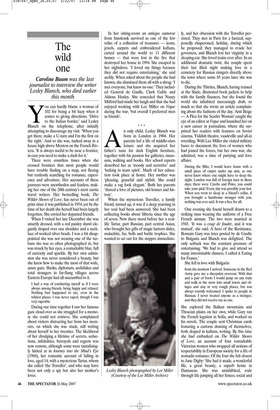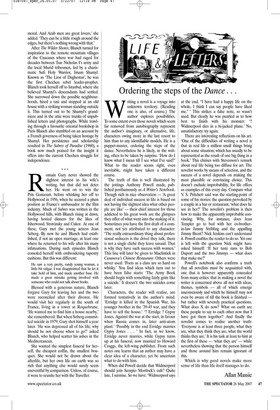The wild one
Caroline Baum was the last journalist to interview the writer Lesley Blanch, who died earlier this month You can hardly blame a woman of 102 for being a bit hazy when it comes to giving directions. ‘Drive to the Italian border,’ said Lesley Blanch on the telephone, after initially attempting to discourage my visit. ‘When you get there, make a U-turn and I’m the first on the right.’ And so she was, tucked away in a house high above Menton on the French Riviera. ‘It is always useful to be near a frontier, in case you need to make a dash for it.’ There were countless times when she crossed frontiers that most people would have trouble finding on a map, not fleeing but restlessly searching for romance, experience and adventure. Her accounts of these journeys were unorthodox and fearless, making her one of the 20th century’s most exotic travel writers. Her bestselling book, The Wilder Shores of Love, has never been out of print since it was published in 1954, yet by the time of her death she herself had been largely forgotten. She envied her departed friends.
When I visited her last December she was smartly dressed, with a red paisley shawl elegantly draped over one shoulder and a necklace of worked silver beads. I was a bit disappointed she was not wearing one of the turbans she was so often photographed in, but was struck by her eyes, a remarkable blue, full of curiosity and sparkle. By her own admission she was never considered a beauty, but she knew how to make the most of that wide, azure gaze. Sheiks, diplomats, archdukes and total strangers in far-flung villages across Eastern Europe had all succumbed to it.
I had a way of conducting myself as if I were always among friends, being happy and relaxed. Nothing bad happened to me, even in the wildest places. I was never raped, though I was very rapeable.
During our time together I saw her famous gaze cloud over as she struggled for a memory she could not retrieve. She complained about visitors distracting her from her memoirs, on which she was stuck, still writing about herself in her twenties. The likelihood of her divulging a lifetime of secrets, seductions, infidelities, betrayals and regrets was now remote, although some were tantalisingly hinted at in Journey into the Mind’s Eye (1968), her romantic account of falling in love, aged 14, with a mysterious Tartar, whom she called ‘the Traveller’, and who may have been not only a spy but also her mother’s lover. In her sitting-room an antique samovar from Smolensk survived as one of the few relics of a collection of treasures — icons, jewels, carpets and embroidered kaftans, carted around the world to 11 different homes — that were lost in the fire that destroyed her house in 1994. She escaped in her nightdress. ‘I loved my things because they did not require entertaining,’ she said archly. When asked about the people she had known, she dismissed them all with a shrug: ‘I met everyone, but knew no one.’ They included General de Gaulle, Clark Gable and Aldous Huxley. She conceded that Nancy Mitford had made her laugh and that she had enjoyed working with Lee Miller on Vogue during the war, ‘but overall I preferred men as friends’.
An only child, Lesley Blanch was born in London in 1904. Her parents led a life of middle-class leisure and she acquired her father’s taste for dark English furniture, together with his passion for galleries, museums, walking and books. Her school reports described her as ‘moody and secretive’ and ‘lacking in team spirit’. Much of her education took place at home. Her mother was ‘pleasing, graceful and stylish. She could make a rag look elegant.’ Both her parents ‘shared a love of pictures, old houses and history’.
When the mysterious Traveller, a family friend, turned up, it was if a deep yearning in her soul had been answered. She had been collecting books about Siberia since the age of seven. Now there stood before her a reallife Tartar, part Russian, part central Asian, who brought her gifts of magic lantern slides, malachite, fur, bells and battle trophies. She wanted to set out for the steppes immediate ly, and her obsession with the Traveller persisted. They met in Paris for a farcical, supposedly chaperoned, holiday, during which he proposed; they managed to evade her governess, and Blanch lost her virginity in a sleeping-car. She loved trains ever after. In an additional dramatic twist, the couple spent their last illicit night making love in a cemetery for Russian émigrés directly above the town where some 85 years later she was to die.
During the Thirties, Blanch, having trained at the Slade, illustrated book jackets to help with the family finances, but she found the world she inhabited increasingly drab, so much so that she wrote an article complaining about the fashions of the day. ‘Anti Beige — A Plea for the Scarlet Woman’ caught the eye of an editor at Vogue and launched her on a new career in journalism, where she surprised her readers with features on Soviet cinema, Yiddish theatre, vaudeville and all-in wrestling. With Lee Miller she visited military bases to document the lives of women who had joined the forces, but her own war, she admitted, was a time of partying and love affairs:
During the Blitz, I would leave home with a small piece of carpet under my arm, as one never knew where one might have to sleep the night. London was full of foreign men in those days; there were Czechs and Poles, you could take your pick! Every day was possibly your last. When you went to sleep in a friend’s cellar, if you brought a handsome stranger with you, nothing was ever said. It was a free for all.
One evening she found herself drawn to a striking man wearing the uniform of a Free French airman. The two were married in 1945. ‘It was a coup de foudre, and it was mutual’, she said. A hero of the Resistance, Romain Gary was later posted by de Gaulle to Bulgaria and Blanch was delighted. The only setback was the constant pressure of entertaining. ‘We had to give and attend so many interminable dinners, I called it Eating for France.’ She fell in love with Bulgaria
from the moment I arrived. Someone in the Red Army gave me a sheepskin overcoat. With that and a pair of boots I would jump on any train and walk in the snow into small towns and villages and stay in very rough places, but was always warmly welcomed. I spoke to people in Russian. I never treated anyone as a stranger, and they did not receive me as one.
She explored the Balkan mountains and Thracian plains on her own, while Gary ran the French legation in Sofia, and worked on his novels. The couple sent Christmas cards featuring a cartoon drawing of themselves, both draped in kaftans, writing. By this time she had embarked on The Wilder Shores of Love, an account of four remarkable Victorian women who swapped all notions of respectability in European society for a life of nomadic romance. Of the four she felt closest to Jane Digby: ‘She had it made, a wonderful life, a great beauty, a superb home in Damascus. She was uninhibited, rode through life jumping all her fences, social and moral. And Arab men are great lovers,’ she added. ‘They can be a little rough around the edges, but there’s nothing wrong with that.’ After The Wilder Shores, Blanch turned for inspiration to the remote mountain villages of the Caucasus where war had raged for decades between Tsar Nicholas I’s army and the local Murid tribesmen, led by a charismatic Sufi Holy Warrior, Imam Shamyl. Known as ‘The Lion of Daghestan’, he was the first Chechen rebel leader-prophet. Blanch took herself off to Istanbul, where she believed Shamyl’s descendants had settled. She narrowed down the possible neighbourhoods, hired a taxi and stopped at an old house with a striking woman standing outside it. This turned out to be Shamyl’s grandniece and in the attic were trunks of unpublished letters and photographs. While trawling through a favourite oriental bookshop in Paris Blanch also stumbled on an account by a French governess of being taken hostage by Shamyl. Her persistence and scholarship resulted in The Sabres of Paradise (1960), a book now much praised for the insight it offers into the current Chechen struggle for independence.
Romain Gary never showed the slightest interest in his wife’s writing, but that did not deter her. He went on to win the Prix Goncourt, before whisking her off to Hollywood in 1956, when he secured a plum position as France’s ambassador to the film industry. Much of Sabres was written in the Hollywood hills, with Blanch rising at dawn, having hosted dinners for the likes of Isherwood, Stravinsky and Cukor. At one of these, Gary met the young actress Jean Seberg. By now he and Blanch had established, if not an open marriage, at least one where he returned to his wife after his many infatuations. During such episodes Blanch consoled herself with embroidering tapestry cushions. But this was different:
He saw a very pretty, randy young woman, a little bit vulgar. I was disappointed that he let it take hold of him, and made another base. He made a great mistake getting involved with someone who could not talk about books.
Blessed with a generous nature, Blanch forgave Gary for leaving her and the two were reconciled after their divorce. He would visit her regularly in the south of France, living in a tower at Roquebrune. ‘He wanted me to find him a house nearby,’ she remembered. But when Seberg committed suicide in 1979, Gary shot himself a year later. ‘He was depressed all of his life; why should he not choose when to go?’ asked Blanch, who helped scatter his ashes in the Mediterranean.
She wanted the simplest funeral for herself, the cheapest coffin, the smallest bouquet. She would not be drawn about the afterlife, but her own life on earth was so rich that anything else would surely seem uneventful by comparison. Unless, of course, it were to reunite her with the Traveller.



















































































 Previous page
Previous page